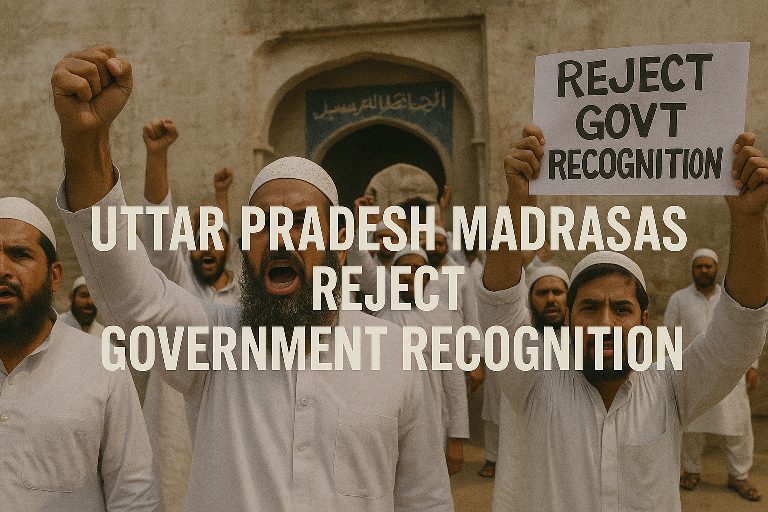Kanpur, Uttar Pradesh: Twelve madrasas in the state have abruptly announced that they are withdrawing their government recognition. They allege that the society’s education and religious freedom are being threatened by constant political interference, administrative laxity and coercive policies in the name of “modernisation”.

Why the move?
• Madrasah administrators, i.e. those responsible for running madrasahs, have a complaint. They say the government is constantly interfering in the education system (how it should be taught),the curriculum (what subjects should be taught),andthe administration (how the madrasah should function).
• Regulations are being imposed in the name of “transparency”. The government is imposing new regulations and restrictions on the unique nature of madrasah education,which it calls “transparency,” but to the madrasah administrators, it seems like too much control.
For example: Mandatory uploading of student-teacher data on platforms like UIDAI and UDISE+ is a burden for many technologically-challenged madrasas.
READ MORE: Emergency Tree Removal Service: Immediate Solution to Storms and Accidents!
• The central and state governments have promised to provide “modern education” to madrasas that is, to guide madrasa students to learn advanced subjects, technical knowledge, etc.
• But in practice, even though the government claims that the buildings, classrooms, and health facilities are there, they say, it is not true. Teachers are not trained to teach modern subjects. Even the books that students need to read are not provided with the necessary funds. Complaints have been raised about this from madrasa administrators or the community.
• Uttar Pradesh Chief Minister Yogi Adityanath-led government has announced a plan to change the Madrasa education system. That is, they plan to change the curriculum in Madrasas to the NCERT (National Curriculum Framework) model. They also want to introduce modern technologies like AI (Artificial Intelligence) in Madrasa education. However, some are criticizing that this plan is just propaganda and has not brought any real change or benefit in practice.
“We are fighting for self-respect” : Madrasa administrators
Maulana Tariq Qasim from Kanpur said :
“The government always talks about religious harmony. But without respecting the autonomy of Madrasas, it imposes new orders every day. This is a systematic oppression.”
Modernization vs Practical Issues
On the government’s “modernization” efforts, Maulana Fayaz Ahmed of Unnao said:
“Teachers are not trained, classrooms do not even have fans. But the government is trying to take complete control over the management of madrassas. This is not reform, it is corruption!” he said.
Violation of Supreme Court order?
Bareilly Madrassa Administrator Maulana Farhan Khan pointed out:
“The Supreme Court has ordered to help madrassas. But the government has ignored it and instead has tightened surveillance. This is a conspiracy to destroy madrassas illegally.”
Socio-political implications
• Bitterness in the Muslim community: Such actions are seen as a “casteist” policy targeting the Muslim community. “They are defaming the entire society by calling madrassas ‘centres of extremism’,” says Aslam Usmani, a madrassa teacher in Lucknow.
• Right to education affected: There are about 2.5 lakh (2,50,000) students studying in Madrasas in Uttar Pradesh. Currently, due to government actions (interference, lack of funds, regulations, etc.), the right to education of those students is being affected. As a result, their future is uncertain (i.e., nothing is certain).
Conclusion
The current stance of madrasas,i.e. their reaction against government intervention, regulations, and lack of funding,should be seen as a warning. It is considered a social warning against one-sided policies of the government direct intervention without seeking the views of madrasas.Most importantly, education should not be politicized.
The idea is to reach an amicable solution through indirect talks, rather than imposing changes on madrasas for political purposes.